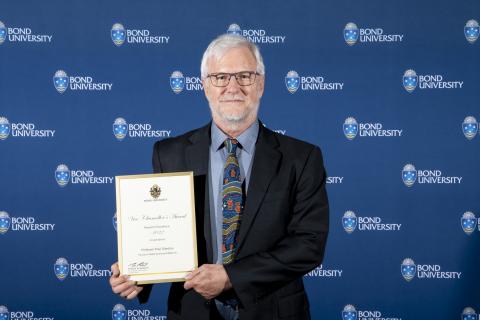
Bond University’s Professor Paul Glasziou AO has been named among the top 1 percent of researchers worldwide.
Professor Glasziou, the Director of the Institute for Evidence-Based Healthcare, made the Clarivate Highly Cited Researchers 2023 list.
To be considered, researchers must have authored multiple papers which rank in the top 1 percent by citations for their fields. There are 7125 researchers on the list, representing 0.1 percent of the world's scientists.
Dr Glasziou is a professor of evidence-based medicine who was previously Director of the Centre for Evidence-Based Medicine at the University of Oxford.
His key interests include identifying and removing the barriers to using high quality research in everyday clinical practice. He remains a part-time General Practitioner.
Meanwhile, an update of Stanford University’s list of the top 2 percent of most-cited scientists includes dozens of past and present Bond University academics.
The list ranks academics based on how frequently their work is cited by other scholars. It takes into account the individual’s entire career as well as their one-year impact.
Bond academics who made the list in the career category were:
• Assistant Professor Alex Acheampong
• Dr Hilda Bastian
• Associate Professor Elaine Beller
• Assistant Provost Dawn Bennett
• Professor Russell Chess-Williams
• Professor Chris Del Mar
• Professor Robert Faff
• Honorary Adjunct Cynthia D. Fisher
• Professor Paul Glasziou
• Honorary Adjunct Professor David Henry
• Professor Tammy Hoffmann
• Adjunct Professor Laurence Howes
• Associate Professor Dr. Mark Jones
• Associate Dean, Research Justin Keogh
• Professor Craig Langston
• Professor Michelle McLean
• Honorary Adjunct Assistant Professor Ray Moynihan
• Professor Martin Skitmore
• Executive Dean, Professor Nicholas Zwar
Bond academics who made the list in the one-year impact category were:
• Assistant Professor Alex Acheampong
• Assistant Professor Loai Albarqouni
• Dr Hilda Bastian
• Associate Professor Elaine Beller
• Assistant Provost Dawn Bennett
• Research Enhancement Manager Justin Clark
• Professor Chris Del Mar
• Professor Robert Faff
• Honorary Adjunct Cynthia D. Fisher
• Professor Paul Glasziou
• Honorary Adjunct Professor David Henry
• Professor Tammy Hoffmann
• Professor Elizabeth Isenring
• Associate Professor Cindy Jones
• Associate Professor Mark Jones
• Associate Dean, Research Justin Keogh
• Professor Craig Langston
• Assistant Professor Skye Marshall
• Professor Michelle McLean
• Professor Sharon Mickan
• Assistant Professor Dr Ray Moynihan
• Professor Rob Orr
• Post-Doctoral Research Fellow John Rathbone
• Assistant Professor Anna Mae Scott
• Professor Martin Skitmore
• Honorary Adjunct Associate Professor Rae Thomas
• Professor William Forde Thompson
• Executive Dean, Professor Nicholas Zwar

